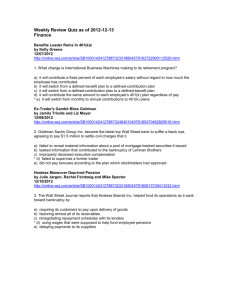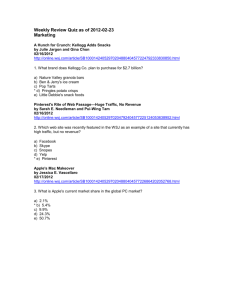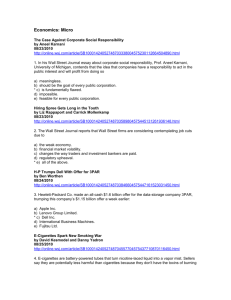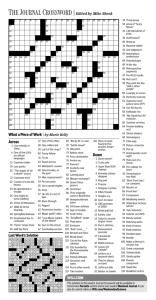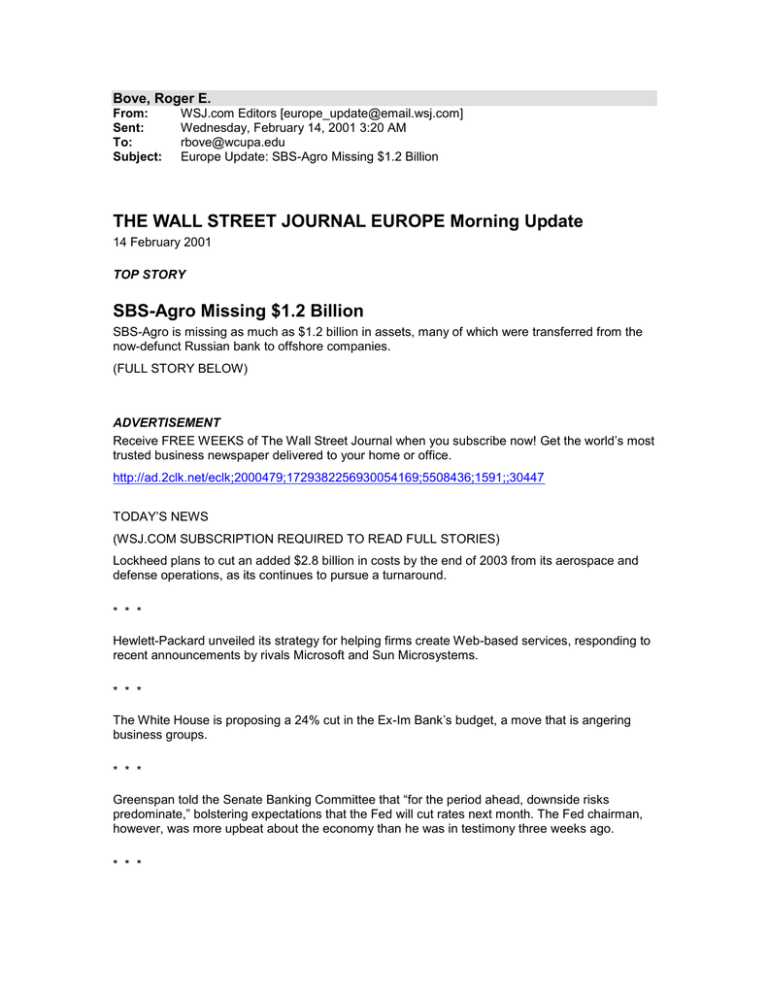
Bove, Roger E.
From:
Sent:
To:
Subject:
WSJ.com Editors [europe_update@email.wsj.com]
Wednesday, February 14, 2001 3:20 AM
rbove@wcupa.edu
Europe Update: SBS-Agro Missing $1.2 Billion
THE WALL STREET JOURNAL EUROPE Morning Update
14 February 2001
TOP STORY
SBS-Agro Missing $1.2 Billion
SBS-Agro is missing as much as $1.2 billion in assets, many of which were transferred from the
now-defunct Russian bank to offshore companies.
(FULL STORY BELOW)
ADVERTISEMENT
Receive FREE WEEKS of The Wall Street Journal when you subscribe now! Get the world’s most
trusted business newspaper delivered to your home or office.
http://ad.2clk.net/eclk;2000479;1729382256930054169;5508436;1591;;30447
TODAY’S NEWS
(WSJ.COM SUBSCRIPTION REQUIRED TO READ FULL STORIES)
Lockheed plans to cut an added $2.8 billion in costs by the end of 2003 from its aerospace and
defense operations, as its continues to pursue a turnaround.
* * *
Hewlett-Packard unveiled its strategy for helping firms create Web-based services, responding to
recent announcements by rivals Microsoft and Sun Microsystems.
* * *
The White House is proposing a 24% cut in the Ex-Im Bank’s budget, a move that is angering
business groups.
* * *
Greenspan told the Senate Banking Committee that “for the period ahead, downside risks
predominate,” bolstering expectations that the Fed will cut rates next month. The Fed chairman,
however, was more upbeat about the economy than he was in testimony three weeks ago.
* * *
Europe’s Parliament is expected to pass a new law on copyright protection, urged on by a U.S.
court decision on Napster as evidence of the need for greater protection against Internet-enabled
piracy.
* * *
Decode and Roche plan to report progress in turning two gene discoveries into potential
treatments for schizophrenia and the narrowing of arteries.
* * *
Federal drug regulators can’t restrict advertising by pharmacists who sell so-called drug
compounds, an appeals court ruled.
* * *
The EU proposed new measures to get rid of mounting quantities of unwanted beef caused by
the mad-cow crisis, including an overhaul of its subsidy system to limit future beef production.
To read any of the articles above, please see:
http://interactive.wsj.com/european/p/eurohome.html
To read any of the articles above, please see: http://wsj.com
FEATURES
(WSJ.COM SUBSCRIPTION REQUIRED TO READ FULL STORIES)
A corruption trial now rocking the French political establishment has all the elements of an oldfashioned thriller—slush funds, a fugitive from justice and a mystifying arms deal.
* * *
Heard on the Street: Microsoft officials have played up their newest product, Windows XP. But
when it comes to the company’s shares, Wall Street is still crooning a more downbeat tune.
To read any of the articles above, please see:
http://interactive.wsj.com/european/p/eurohome.html
To read any of the articles above, please see: http://wsj.com
ADVERTISEMENT
Learn what the press is saying about your business,
stay on top of vital developments in your industry,
check out a client’s activities with the Publications
Library from Factiva, a Dow Jones & Reuters company
available at WSJ.com.
http://ad.2clk.net/eclk;1997234;1729382256930054169;5508436;1584;;58980
TOP STORY (IN FULL)
Audit Reveals More Than $1 Billion
Vanished From Failed Russian Bank
By ANDREW HIGGINS
Staff Reporter of the Wall Street Journal
MOSCOW—Assets valued at as much as $1.2 billion have been spirited away from Russian
banking group SBS-Agro, which collapsed after Russia’s 1998 financial crisis and still owes major
Western banks around $700 million, say bankers and officials familiar with the preliminary results
of a forensic investigation by accounting firm KPMG LLP.
Many of the missing assets were transferred to obscure companies registered in Cyprus and
other offshore centers, say people familiar with the matter. Among property under scrutiny is
Alexander House, a lavishly renovated Moscow mansion that served as SBS-Agro’s
headquarters and is now occupied by a state-affiliated think tank that drafted President Vladimir
Putin’s economic blueprint.
Once Russia’s largest private retail bank, SBS-Agro has become a symbol of Russia’s troubled
efforts to reform a banking system blitzed by the 1998 debacle, when the government defaulted
on part of its debt and devalued the ruble. Many major Russian banks reneged on their
obligations and then shifted good assets to legally separate shadow banks.
SBS-Agro was founded and controlled by Alexander Smolenksy, a former typesetter who became
a prominent member of a small group of tycoons known as oligarchs. He now presides over a
nationwide network of nominally new banks that are headed by former SBS-Agro executives, use
former SBS-Agro computers and are mostly housed in former SBS-Agro branches.
KPMG declined to comment on its findings. Mr. Smolensky’s spokesman was not available for
comment.
A Russian government agency responsible for clearing the debris left by the 1998 crisis
announced Tuesday that it had won approval from a majority of SBS-Agro creditors for an
“amicable settlement” that will give foreign banks only one cent on the dollar. The settlement will
give tens of thousands of Russian depositors 10% of their money immediately and the rest in
various long-term government bonds and other promissory notes.
Alexander Turbanov, head of the Agency for Restructuring Credit Organizations, said creditors
holding 62% of SBS-Agro’s debts had voted to endorse the proposed settlement at a meeting in a
Moscow sports stadium. The alternative was to declare SBS-Agro immediately bankrupt, but
under Russian law, liquidation would make it even harder to reverse any suspicious shifts of
assets. A group of foreign banks had pressured ARCO to hire KPMG to conduct its independent
research.
Foreign banks, most of which nonetheless voted for the settlement, hope they might get more of
their money back as a result of the KPMG probe if it establishes clear evidence of asset stripping.
In a presentation of its initial findings to Western bankers in London, the accounting firm detailed
suspicious transfers of property, the people familiar with the matter said, and other SBS-Agro
assets carried out to put them beyond the reach of creditors.
A survey in late 1998 by the World Bank estimated SBS-Agro’s assets at between $1.1 billion and
$1.26 billion, but these have since shriveled to around $210 million, according to ARCO, the
restructuring agency. SBS-Agro’s debts total 49 billion rubles ($1.71 billion). Foreign banks,
whose claims account for 40% of this, include Societe Generale SA of France, the European
Bank for Reconstruction and Development, J.P. Morgan Chase & Co., Bank of America Corp.,
ING Group NV of the Netherlands and Lehman Brothers Holdings Inc.
ARCO is conducting its own investigation into asset transfers but has had trouble recovering
missing property through Russian courts. ARCO officials said Tuesday that the agency had filed
10 suits challenging the transferred SBS-Agro assets, with a total value of around one billion
rubles ($35 million). This is only a tiny fraction of the assets KPMG says have been shuffled in
suspicious circumstances.
Mr. Turbanov, the agency’s head, said KPMG would continue its probe until the summer but had
“so far not collected material on which it would be possible to go to court.” His deputy, Valery
Miroshnikov, who is now in charge of winding down SBS-Agro, said it would be “impossible” to
recover most of the suspiciously transferred assets, whose value KPMG puts at $1.2 billion. “This
figure sounds nice,” he says, adding that “the question is whether it can be ever realized. I don’t
think so.”
Western bankers also say that only a portion of the assets identified by KPMG can be recovered,
but some criticize ARCO for failing to stop what they say has been the hemorrhage of SBS-Agro’s
value since Moscow’s financial markets buckled. A committee representing individual Russian
depositors has vociferously protested ARCO’s handling of SBS-Agro. At a sometimes heated
meeting of creditors in Moscow’s Luzhniki stadium, some angry depositors denounced the
agency and called for Mr. Smolensky’s arrest.
ARCO says its hands are tied because Russian law bars it from questioning or seeking
documents from former SBS-Agro affiliates and offshore firms that now hold much of the bank’s
former property. Many of the assets that appeared on the books of the SBS-Agro Banking Group
before the 1998 crisis belonged to wholly owned or majority-owned subsidiaries that were swiftly
spun off after the crisis and are now legally separate units.
THREE GREAT WAYS TO GET THE WALL STREET JOURNAL
Online - http://interactive.wsj.com/14_regchoice.html
Print - http://getit.wsj.com/
Mobile - http://interactive.wsj.com/banners/wireless.html
WSJ.COM E-MAIL CENTER
To subscribe to any WSJ.com e-mail, visit:
http://public.wsj.com/emailcenter/subscribe.html
To unsubscribe, go to:
http://public.wsj.com/emailcenter/unsubscribe.html
You are currently subscribed as rbove@wcupa.edu
Copyright 2001 Dow Jones & Company, Inc. All Rights Reserved.
Privacy Policy http://interactive.wsj.com/public/resources/documents/privacy.html
Contact Us http://interactive.wsj.com/public/resources/documents/contact.html

